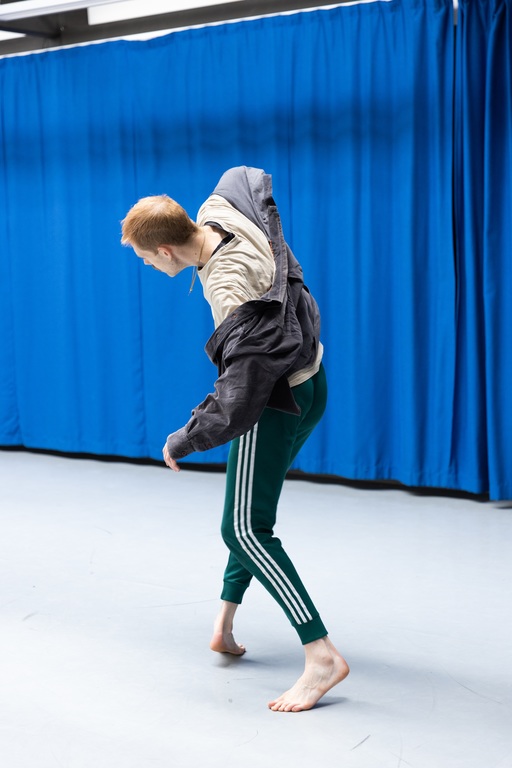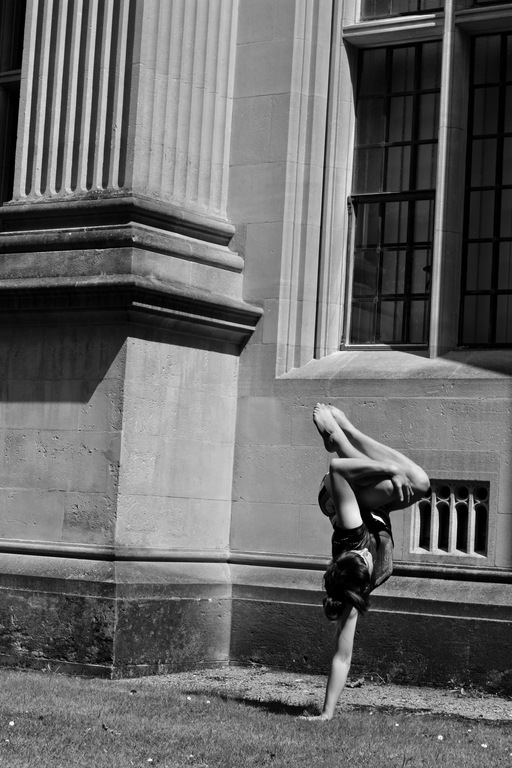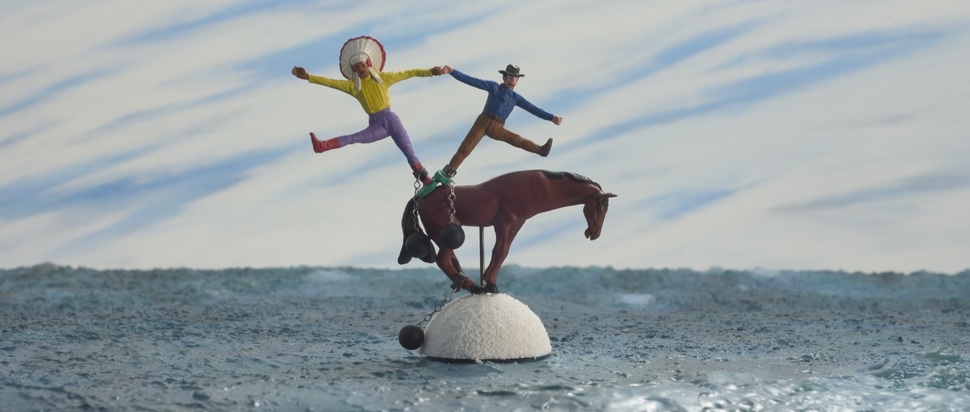Manipulate 2025: Puppets and Embodiment
As Manipulate Festival returns with another celebration of animated film, puppetry and visual theatre, we talk to Artistic Director Dawn Taylor about the programme and the radical potential of intimacy in theatre
Speaking to Artistic Director Dawn Taylor about the Manipulate 2025 Festival programme, she shares a surprising anecdote. A puppeteer, embroiled in a dispute with HMRC, asked if she could write a letter to advocate for them to justify their role as a performer. HMRC had argued that, because the puppeteer was 'just manipulating objects' rather than physically appearing on stage, they were just 'operators' and so the work did not qualify for theatre tax relief. This baffling clash with a powerful governmental institution raises big questions about official perceptions of a performer’s presence, the nature of embodied labour, and the Kafkaesque hurdles surrounding puppetry and artistic work.
Is the puppet autonomous? What is the puppet without the puppeteer, and what is the puppeteer without the puppet? The intimate relationship between puppet and puppeteer is as undeniable as the performativity of the puppeteer’s movements, which breathe life into the inanimate materiality of the puppet. And yet, how can we quantify the incorporeal elements of the life and breath that the puppet borrows?
In a year of having to fight to justify the existence of artists, Taylor tells me that Manipulate’s focus is precisely on them, investing in the Scottish sector, experimentation and de-growth. The festival aims to step back to reflect on what makes the arts in Scotland, and festivals like Manipulate, sustainable. “It's been a terrible year for artists, with the Open Fund closing, [and subsequently re-opening after artists’ protests and public outrage] and it feels like routes to getting work to the stage have become far fewer. We think it's the responsibility of organisations like us to respond to where our community are,” says Taylor.
Taking inspiration from performance artist Adrian Howells – whose 2006 performance Held led audiences through three progressively intimate scenes – visual theatre-maker Al Seed has challenged six artists to create Cartography, an intimate series of offers that reconfigure the audience-artist relationship. These works will be showcased in a labyrinthic journey at the Fruitmarket gallery, experimenting with visual techniques while inviting audiences to wind their way through different performance stations to engage with a variety of experimental forms.
Taylor and Seed share a frustration with the limitations artists have faced, particularly considering ongoing funding challenges and the lack of freedom to make work that really takes risks. “This type of work in particular, as opposed to a play, really takes oxygen and time in a room and expertise and collaboration. And artists have been telling us that that just hasn't felt possible,” says Taylor.

Jack Anderson in Shotput for Snapshots. Image: Amy Sinead
So, within the parameters of intimacy – designed for small audiences of around four – and brevity, the artists were given the autonomy to truly experiment. The resulting works will span a spectrum: some will be more installation-focused, others will lean towards film, and some will be distinctly performative.
There isn’t much detail about the content of the pieces – almost as if the element of surprise is part of the mystique. This lack of information works on two levels: it piques my curiosity while also prompting questions about the subtle power dynamics inherent in intimate and immersive work as artists and small audiences meet. While this tradition of one-to-one or small-audience encounters invites vulnerability, connection, and risk, it also raises broader questions about the capacity of artists to adapt to an era of tightening budgets.
Over a decade ago, Mark Ravenhill complained: “You would think that the theatre, that most public of acts, would resist this transformation into private experience.” Intimacy, however, has long been a hallmark of resourceful artists operating in underfunded or alternative spaces – in the early 2000s, Argentina's post-'corralito' economic crisis living-room theatre scene saw theatre-makers turn their own homes into stages.
Theatre and performance academic Caroline Wake draws parallels between intimate exchanges and the work of highbrow artists like Yoko Ono and Marina Abramović, while also tracing their roots to the crystal-gazers and fortune-tellers of fairground traditions. Reflecting on my own experience, I vividly recall the deeply exposing tarot card reading I had with Chilean filmmaker Alejandro Jodorowsky at Café Le Temeraire in Paris where the lines between performance and life were the most blurred I’ve ever experienced. Jodorowsky believes in group healing so in front of a small audience, I exposed my most intimate thoughts and desires – a moment that left me feeling profoundly vulnerable, exposed, held and healed. Well, at least for 15 minutes.
Contemporary theatre scholar Adam Alston’s take on artist-audience relationships adds to the conversation. He points out that it’s worth questioning how private exposure in these interactions might be exploited and how participatory opportunities aren’t always equally shared. Yet pioneering labyrinthic and immersive work La Menesunda by Marta Minujín and Rubén Santantonín (made in collaboration with Pablo Suárez, David Lamelas, Rodolfo Prayón, Floreal Amor and Leopoldo Maler, it was presented on May 27, 1965, at the Torcuato di Tella Institute in Buenos Aires) absolutely revolutionised the art world. It brought people together in a way that was pretty spectacular.

Acrodance with Gabbi Cook. Image: Simon Abel.
Another promising aspect of the festival is Snapshots, which offers a glimpse of hope for emerging artists and works in progress. Craig McCulloch, who is a deaf artist and physical theatre performer, presents Nightmares, a piece about childhood and how nightmares can help us understand and process challenging things that are going on in our lives that may be too big or scary. This is the culmination of his process, supported by the Creative Fund and featuring an entirely deaf cast and creative team.
Featuring less international live work than in previous editions, the festival still retains a strong sense of internationalism, particularly through its Queer Stories film programme, which remains as global as ever. “There are so many urgent voices and amazing queer voices in animation,” says Taylor. Animation, she notes, creates unique possibilities for storytelling, allowing artists to tackle themes that might be difficult to explore through live-action performance. The result is a programme packed with bold and beautiful work, co-curated with Fraser MacLeod.
Complementing the animation programme is On the Edge, a new initiative co-created with Take One Action. This collaboration marks a first for Manipulate, expanding its lens to explore circumpolar regions – the Arctic and sub-Arctic nations – and their relationships with a changing climate. “Often, when we talk about climate change, we focus on the equator, where communities face its sharpest impacts,” Taylor explains. “But the ripples are felt across the globe, including in northernmost regions. We wanted to ask: What does climate change mean in these areas? And what are the cultural relationships between high-latitude nations?”
Through this thematic approach, On the Edge highlights unexpected links between communities, cultures, and ecosystems in these regions. By shifting the focus to the north, the programme offers audiences a fresh perspective on the global climate crisis while delving into the interconnectedness of cultural and environmental change.
Manipulate 2025 offers a space to reflect and reconnect. Whether you’re delving into the intimate world of Cartography, exploring bold global perspectives in the film lineup, or attending a workshop like So You Think a Puppet Could Tell Your Story Better Than Yourself with the always witty Mamoru Iriguchi and Fergus Dunnet, the festival has a lot to offer.
Manipulate Festival 2025, 12-15 Feb, venues across Edinburgh
